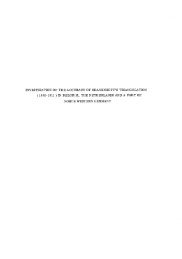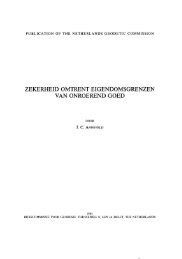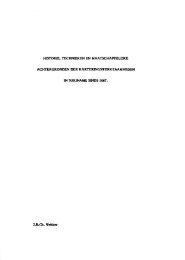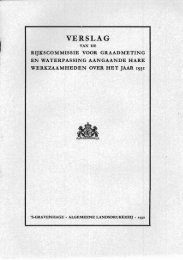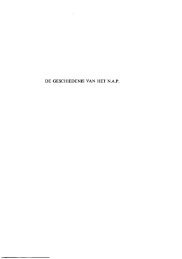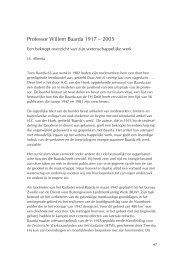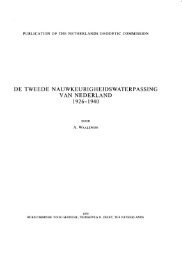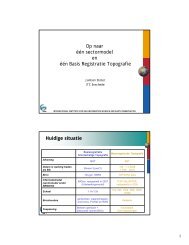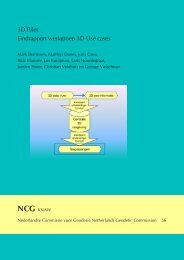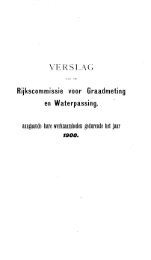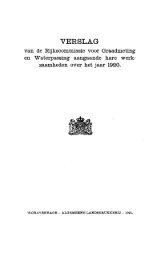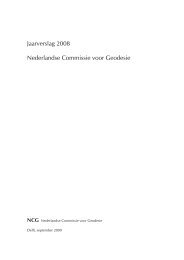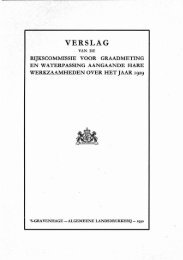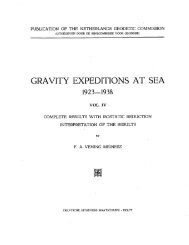SDI Convergence - Nederlandse Commissie voor Geodesie - KNAW
SDI Convergence - Nederlandse Commissie voor Geodesie - KNAW
SDI Convergence - Nederlandse Commissie voor Geodesie - KNAW
You also want an ePaper? Increase the reach of your titles
YUMPU automatically turns print PDFs into web optimized ePapers that Google loves.
As the research progresses more feedback will be sought from key stakeholders and<br />
additional evaluation workshops will be programmed. The focus will not be on what has<br />
been done so far, but to garner ideas and concepts to assist in progressing the development<br />
of the tool.<br />
6. CONCLUSIONS AND<br />
SUMMARY<br />
The MIKE metadata tool shows promise<br />
in assisting the use of Natural Resource Man-<br />
agement<br />
(NRM) models within Victoria, Australia and in providing details of modelling<br />
activities throughout the state. Users have found it easy and efficient as a tool to register<br />
their modelling projects. The entry of the model metadata content describing the<br />
models is proving more cumbersome and future ways to streamline or improve this activity<br />
need to be sought. Although some other groups have demonstrated success in<br />
automating storage of model runs and model run metadata (Steenman-Clark, 2004)<br />
this is usually in the context of more tightly focused modelling at few locations or more<br />
isolated laboratory based modelling and processing systems. In our case the modelling<br />
activity is widely dispersed geographically and is undertaken using a multitude of continually<br />
evolving models. This makes automated approaches difficult to achieve at this<br />
time. With the growing number of digital datasets and models being developed and deployed<br />
it is critical that metadata not just around fundamental datasets, but also around<br />
models such as land use change and impact models be properly developed. Across<br />
the board the development and maturation of standards for models and model metadata<br />
is required, similar to those that have been developed and continue to evolve for<br />
data and data metadata. This will be a crucial step in the evolution of an e-science<br />
framework for supporting knowledge management and collaboration.<br />
Further areas of research will include improving the model metadata schema and col-<br />
laboration<br />
to assist further standardisation of the model metadata content (for improved<br />
search and query). Exploration of the potential to more automatically extract and capture<br />
model metadata and store parameters and data associated with a model instance<br />
is also a next step. However progressing this is a real challenge due to model dispersion,<br />
complexity and variety. More immediate next tasks will be to further improve the<br />
entry and display of the model metadata. In particular there will be a focus on ways to<br />
geographically visualise multiple modelling efforts and temporal views of modelling activity<br />
within landscapes.<br />
ACKNOWLEDGEMENTS<br />
The authors wish to thank the Victorian Department of Industry, Innovation and Re-<br />
gional<br />
Development and the Victorian Department of Primary Industries for funding this<br />
research. Additionally we wish to acknowledge the assistance and support of the Our<br />
Rural Landscapes research program and all our colleagues there-in that have given of<br />
their time and provided such useful and constructive feedback.<br />
REFERENCES<br />
Boughton, W. (2005).<br />
Catchment water balance modeling in Australia 1960-2004, Agriculture<br />
and Water management, 71: 91-116.<br />
Bridewell, W., Sanchez, J., Langley, P. and Billman, D. (2006). An interactive environment<br />
for the modeling and discovery of scientific<br />
knowledge, International Journal<br />
of Human-Computer Studies, 64(11): 1099-1114.<br />
148



